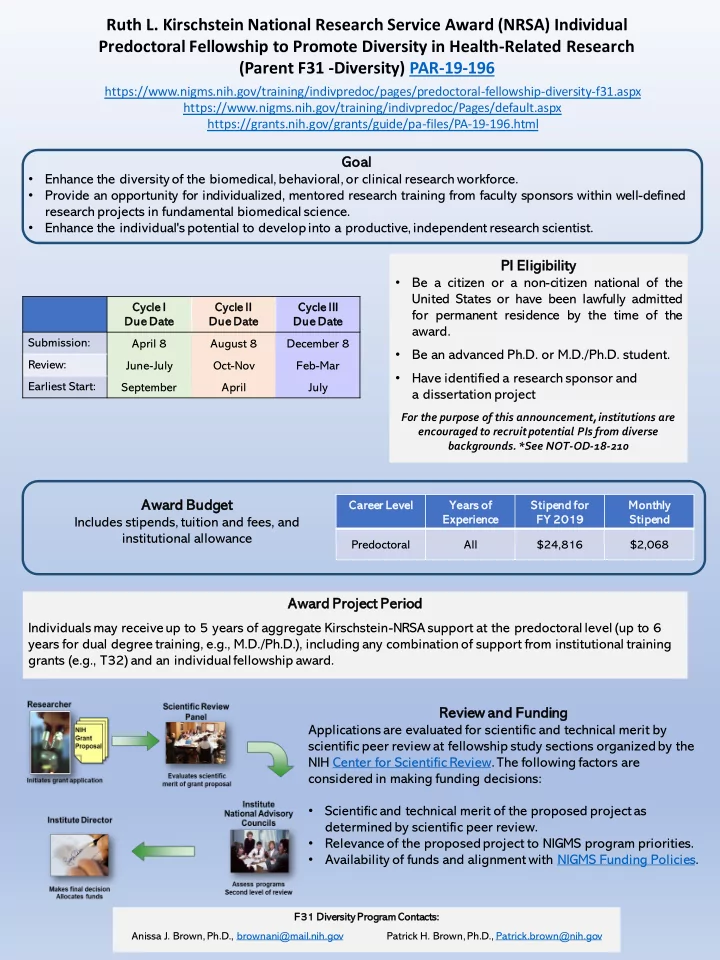

Ruth L. Kirschstein National Research Service Award (NRSA) Individual Predoctoral Fellowship to Promote Diversity in Health-Related Research (Parent F31 -Diversity) PAR-19-196 https://www.nigms.nih.gov/training/indivpredoc/pages/predoctoral-fellowship-diversity-f31.aspx https://www.nigms.nih.gov/training/indivpredoc/Pages/default.aspx https://grants.nih.gov/grants/guide/pa-files/PA-19-196.html Goal • Enhance the diversity of the biomedical, behavioral, or clinical research workforce. • Provide an opportunity for individualized, mentored research training from faculty sponsors within well-defined research projects in fundamental biomedical science. • Enhance the individual's potential to developinto a productive, independent research scientist. PI Eligib igibilit ility • Be a citizen or a non-citizen national of the United States or have been lawfully admitted Cycle e I Cycle e II Cycle e III for permanent residence by the time of the Due e Date Due e Date Due e Date award. Submission: April 8 August 8 December 8 • Be an advanced Ph.D. or M.D./Ph.D. student. Review: June-July Oct-Nov Feb-Mar • Have identified a research sponsor and Earliest Start: September April July a dissertation project For the purpose of this announcement, institutions are encouraged to recruit potential PIs from diverse backgrounds. *See NOT-OD-18-210 Award Budget Caree eer Level el Years of Stipend for or Monthly Exper erience FY 2019 19 Stipend Includes stipends, tuition and fees, and institutional allowance Predoctoral All $24,816 $2,068 Award d Proje ject ct Perio iod Individuals may receive up to 5 years of aggregate Kirschstein-NRSA support at the predoctoral level (up to 6 years for dual degree training, e.g., M.D./Ph.D.), including any combination of support from institutional training grants (e.g., T32) and an individual fellowship award. Revie iew and Funding Applications are evaluated for scientific and technical merit by scientific peer review at fellowship study sections organized by the NIH Center for Scientific Review. The following factors are considered in making funding decisions: • Scientific and technical merit of the proposed project as determined by scientific peer review. • Relevance of the proposed project to NIGMS program priorities. • Availability of funds and alignment with NIGMS Funding Policies. F31 Diversity Program Contacts: Anissa J. Brown, Ph.D., brownani@mail.nih.gov Patrick H. Brown, Ph.D., Patrick.brown@nih.gov
NIH Maximizing Opportunities for Scientific and Academic Independent Careers (MOSAIC) Program The MOSAIC program is part of NIH’s efforts to enhance diversity within the academic biomedical research workforce, and is designed to facilitate the transition of promising postdoctoral researchers from diverse backgrounds into independent faculty careers in research-intensive institutions (see NOT-OD-18-210 for examples of groupsunderrepresented in the biomedical research workforce at the faculty level). MOSAIC Postdoctoral Career Transition Award to Promote Diversity (K99/R00) PAR-19-343 MOSAIC Institutionally-Focused Research Supports postdoctoral scientists from diverse Education Cooperative Agreement to backgrounds conducting research in areas Promote Diversity (UE5)PAR-19-342 within the mission areas of participating NIH ICs by providing up to 5 years of support in two Supports independent organizations (e.g., phases: scientific societies) to equip MOSAIC A. The initial (K99) phase provides support K99/R00 scholars with professional skills and for up to 2 years of mentored provide them with the appropriate postdoctoral research training and career mentoring, professional networks, and development. enhanced institutional responsibility to allow them to transition into, advance, and B. The second (R00) phase provides up to 3 succeed in independent academic research years of independent research support , careers at research-intensive institutions. which is contingent on satisfactory First application due date – November 15, progress during the K99 phase and an 2020 approved, independent, tenure-track (or equivalent) faculty position. Cohort 5 K99/R00 Cohort 1 Participating NIH ICs : • National Institute of General Medical Sciences ( NIGMS ) • UE5 National Human Genome Research Institute Cohort 2 ( NHGRI ) • National Institute of Biomedical Imaging and Cohort 4 Bioengineering ( NIBIB ) • National Institute on Minority Health and Health Disparities ( NIMHD ) Cohort 3 • National Institute of Nursing Research ( NINR ) Scholars will be part of organized scientific cohorts and will be expected to participate in For more information, visit http://bit.ly/nihmosaic mentoring, networking, and professional Program contact: Dr. Kenneth Gibbs, development activities coordinated by MOSAIC kenneth.gibbs@nih.gov Institutionally-Focused Research Education Tweet @NIGMSTraining #NIHmosaic Award to Promote Diversity (UE5) grantees. First application due date February 12, 2020
Recommend
More recommend